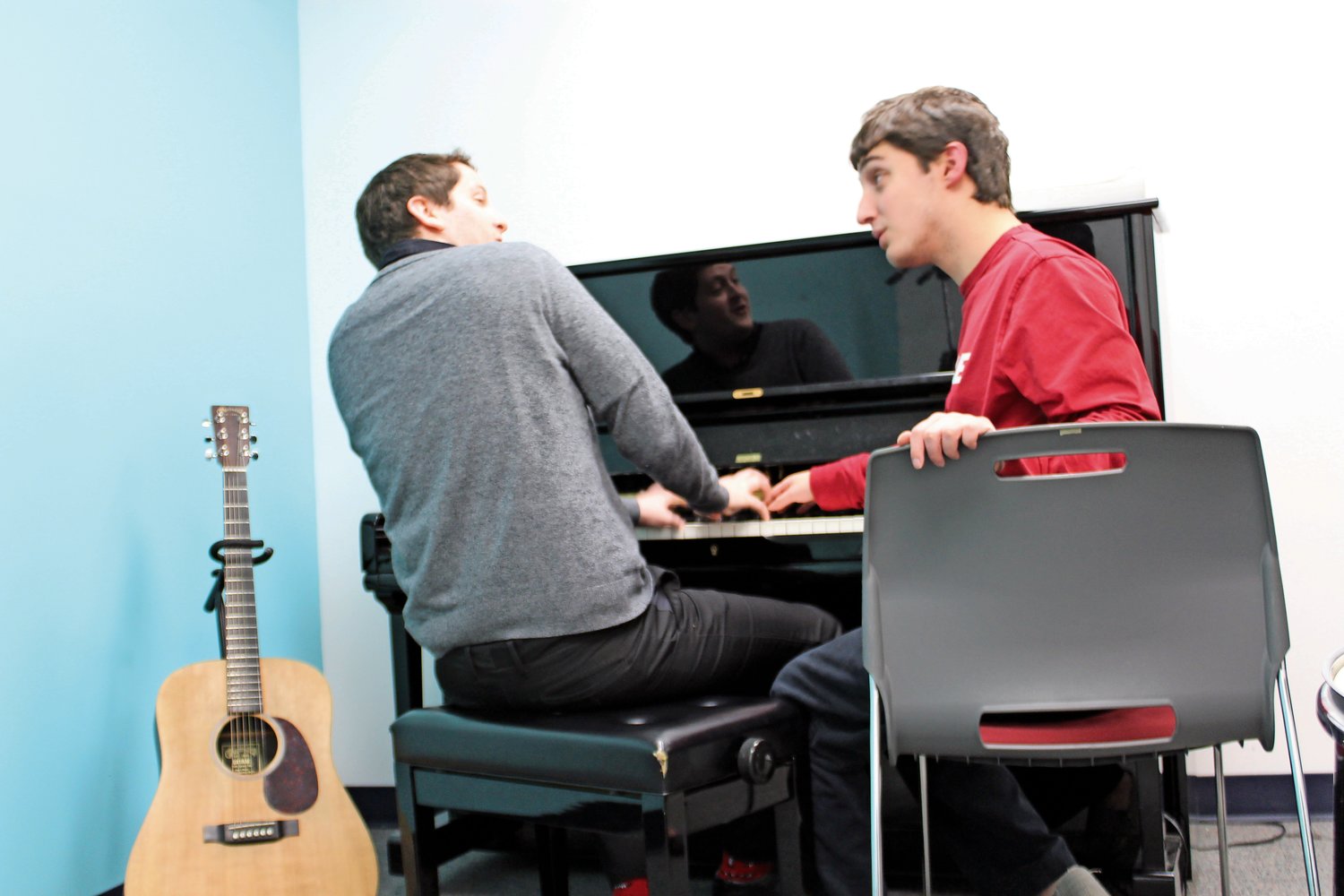Molloy College's Rebecca Center a force for music therapy
As late afternoon turned to evening on a Tuesday earlier this month, a corner of Molloy College’s Kellenberg Hall basement came alive with music, as clients of the Rebecca Center for Music Therapy in Rockville Centre engaged in their weekly sessions.
It would seem small and simple to most, but plain rooms with a few bongo drums, a piano and acoustic guitar is where the magic happens. For patient Christopher Troiano, 21, these walls are his “forever home,” his father, Frank, said.
Christopher has been going to the center since he was 5 years old. He has severe autism and is mostly non-verbal. In the music room, though, “he’ll do things and you’ll go ‘where did that come from?’” Frank noted.
The Troianos live in Albertson, so it can be difficult to get there at 5:30 p.m. on a weekday, but “it’s always worth it,” Frank said. Christopher’s former music teacher referred him to the center at a young age because she noticed he had perfect pitch.
“Nothing will solve everything with Chris,” Frank lamented. “But it’s made him a better person, [helped him] to engage more.”
Michael Kelliher, a music therapist at the Rebecca Center for the past six years, sat down at a piano with Christopher that evening in one of the center’s four private treatment rooms. To their right, Anne McGoldrick, a sophomore music therapy major at Molloy, sat behind a tall bongo.
As part of her studies, McGoldrick, of Shirley, is practicing as a music therapy observational student at the Rebecca Center. “It’s been one of the best experiences of going to school,” she said. It was soon clear why.
Kelliher chose and led the first tune from the Beatles songbook, singing and playing piano to “If I Fell.” McGoldrick periodically kept a tempo on the drum and added her vocals.
Slowly, Christopher began to sing along. By the end, the young man who, minutes ago, buried his head down in his smart phone and avoided eye contact seemed excited to make music. He chose the next song, another Beatles hit, “Why Don’t We Do It In The Road?” and the next, “She’s Leaving Home.”
The three jammed out, and at the end, Christopher turned the page to “Sgt. Pepper’s Lonely Hearts Club Band.” But the session was over, and at 6 p.m., he’d move to the next room for “band practice,” Kelliher told him. Every Tuesday, clients come together for a music performance group session. For Christopher, this was just his warm-up.
The methods
John Carpente, founder and director of the Rebecca Center, explained how a session typically goes for newer patients, who could be anywhere from 2 years old to adulthood seeking treatment for a cognitive or emotional disability.
The therapist and client play around with percussive and melodic percussive instruments. The therapist will either imitate the patient’s actions or play music to evoke a response from them or get them to play along.
“The music therapist improvises music to be communicative and relational,” Carpente said. “So patients experience a range of affect.”
“So if I play faster, will [the client] play faster and will [they] adapt and realize something is different?” he mused. “We help them become aware of [their behavior], not try to stop it.”
The center video records each session so therapists can review patients’ behaviors and progress. They also review sessions with parents or caregivers and help them create future treatment plans.
“We look back and see which themes they were most responsive to and create clinical themes around that,” Carpente said.
He also noted that, with children, academics connect to social skills, and music therapy can be a great window in to learning where a patient with autism stands in their social learning.
In addition to the clinical practice, the Rebecca Center conducts research about music therapy and its impacts. It is currently working to publish a study providing evidence that by imitating clients, music therapists help them with engagement and communication skills.
A growing force
Research is just one way the center has grown in its 20 years of existence — when he first started the endeavor, Carpente didn’t think he’d be conducting research and publishing articles, let alone giving talks on music therapy nationwide.
Carpente earned a bachelor’s in music therapy from Molloy in 1996. Then, he got his master’s from NYU and Ph.D. from Temple University.
The music therapist launched the Rebecca Center in a church basement in 2000. Then, in 2002, he rented out space from Molloy College. The Rebecca Center was its own entity then, but by 2008, Molloy took the program over, with Carpente still at the helm. “We started out serving little kids, now it’s beyond and throughout lifespan,” he reflected.
Still, the center focuses several of its programs with youth. It partners with local school districts — Garden City, Valley Stream, Oceanside, Hewlett and East Rockaway — to provide services to students with autism from those schools. The Rebecca Center also works with students transitioning out of high school with its Campus Connections program.
All the while, the center partners with other disciplines on the Molloy campus, lending its expertise to other areas such as mental health with wellness drum circles. It also welcomes music therapy observational students, like McGoldrick, and includes them in research projects. “We’re training tomorrow’s music therapists,” Carpente said.
Going forward, Carpente is continuing the center’s Unity Through Diversity concerts to showcase the diverse musicians’ work. Clients like Christopher, who attend performance group, prepare music to play for an audience at Madison Theatre each semester. The first performances were held last April and November.
For more information, visit therebeccacenter.org

 47.0°,
Overcast
47.0°,
Overcast 




